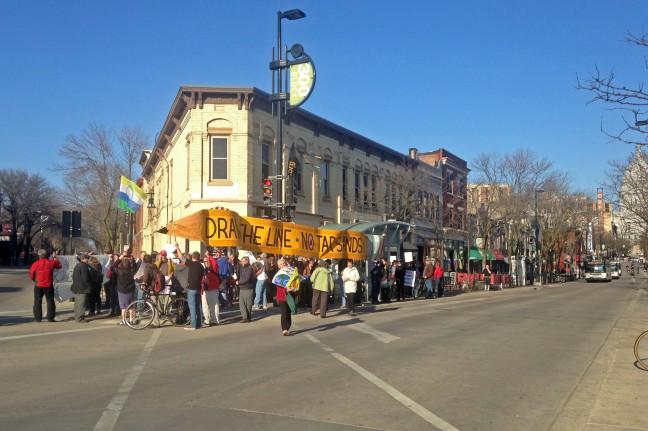Protesters from 350Madison and the Fossil Free UW Coalition marched down State Street Tuesday to raise awareness about climate change and fossil use use, issues that have been drawn into focus by University of Wisconsin governance groups.
Both organizations have actively been promoting divestment, or reducing the university’s assets invested in fossil fuel companies.
“Plain and simple, [divestment] is saying the university no longer wants to make money off of further destruction of the planet,” Teresa Arrate, a member of Fossil Free UW Coalition, said. “There is a financial argument, but more importantly it’s a big ethical and moral issue.”
Both Madison and Dane County have passed resolutions in support of divestment efforts. Although neither currently invests in such companies, their commitment states they will not invest in the future, according 350Madison’s website.
However, if the campus were to fully divest from the fossil fuel industry, the UW Foundation, the university’s fundraising arm, would discontinue investing its assets in companies that produce fossil fuels, professor Bruce Barrett, the Faculty Senate member who originally proposed a divestment resolution, said.
The Associated Students of Madison passed a resolution in support of a fossil fuel divestment plan last month.
Faculty Senate did not reach the same conclusion. When Barrett moved to adopt his resolution regarding climate change and fossil fuels divestment last May, the Senate moved to table the resolution to further research, according to the minutes report from the meeting.
“Divestment is worth supporting because it sends a big message and would draw a lot of attention,” Barrett said.
He said humans largely impact climate change and it could be the biggest issue facing modern society.
Last June, the University Committee organized the Ad Hoc Committee on Fossil Fuel and Climate Change to investigate whether Faculty Senate should take a position on the issues, according to a report produced by the committee.
Faculty Senate adopted the official report in February, which professor of political sciences and committee leader Donald Downs said was accepted unanimously with parts of the report not recommending divestment.
The divestment community is looking to place UW at the forefront of pressuring fossil fuel companies and policymakers to decrease the use of fossil fuels, Downs said. However, he said the issue is far more complex than that.
The unpredictability of divestment’s effect on the price of stock, or other donations to the university, should not be ignored because it would not just affect fossil fuel companies alone, but thousands of companies that provide services to them, he said.
“[The majority of the committee] considered divestment a ‘red herring’ and a divergent from the real hard work that needs to be done to deal with climate change in the future,” Downs said. “It could alienate potential allies and that it over-simplifies the complicated debate about what to do.”
Craig Benson, ad hoc committee member and civil and environmental engineering chair, said campus has an important role in addressing this issue.
He said the university should “do what it does best” and put a greater effort toward organizing people around creating solutions for climate change problems, rather than making advocacy statements, which divestment could be interpreted as.
However, Benson said the attention around divestment has sparked important conversations about the issue of climate change. One initiative they recently created is Climate Quest, a competition that will award grants to teams with practical, high-impact solutions to mitigate or adapt to climate change.
“It’s not the energy producers that are creating climate change, it’s the people who buy the stuff, like you and me,” Benson said. “People need to decide to live their lives differently, and when they do that, then change will happen.”
Editor’s note: Downs serves as an advisor to The Badger Herald.



















